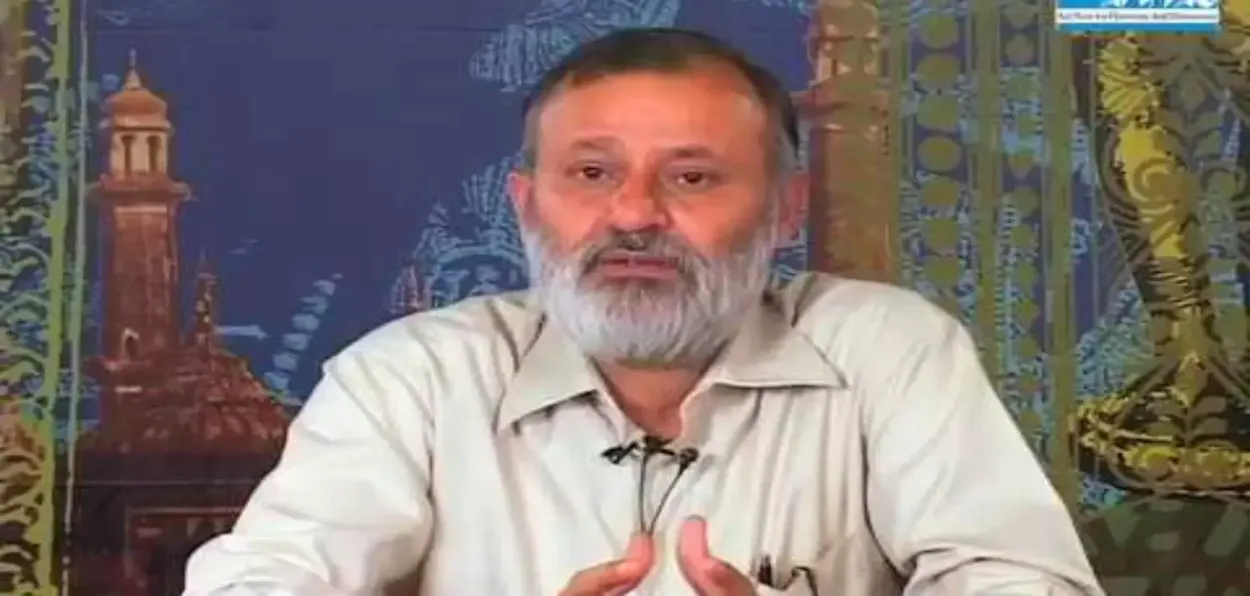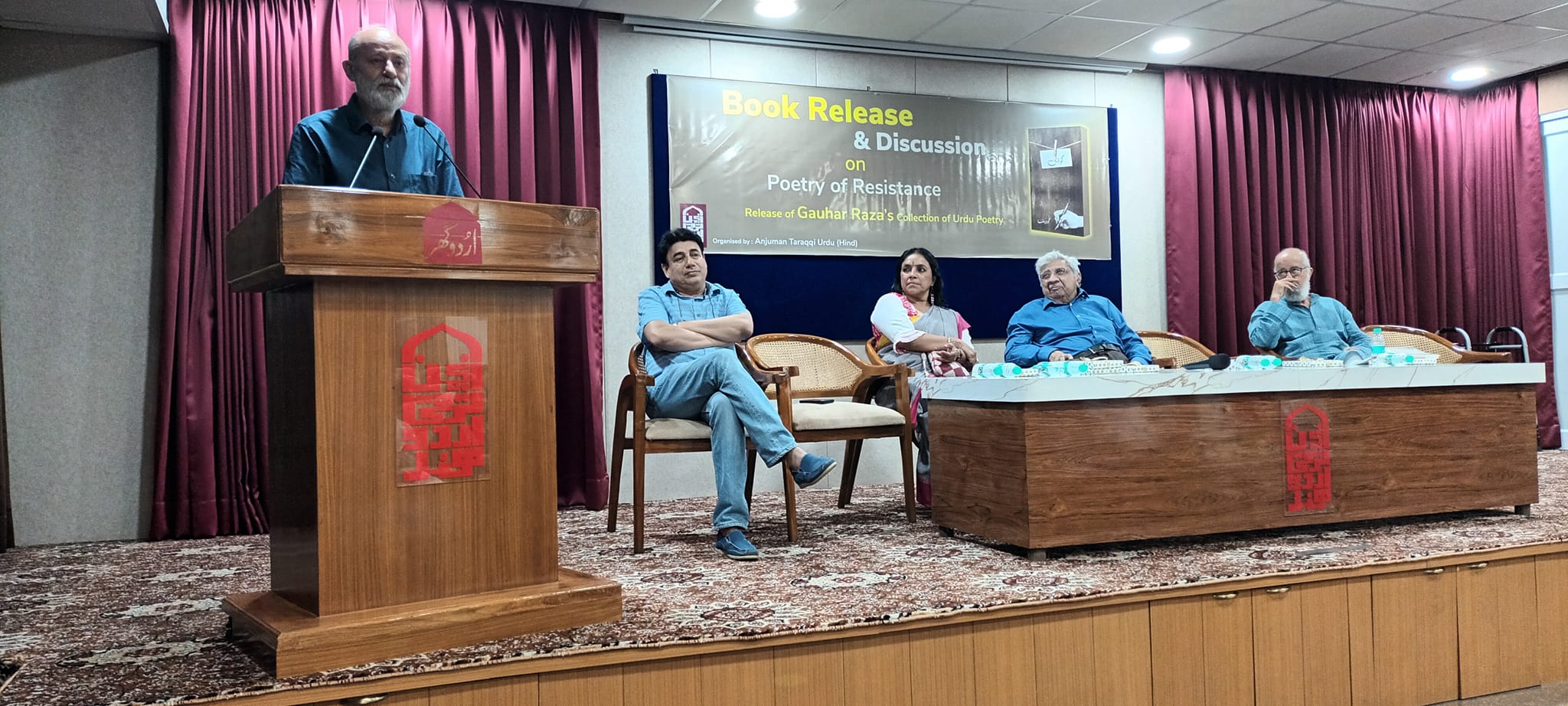
Saquib Salim
Gauhar Raza holds a special place in Urdu literature on two unrelated accounts. First, arguably he is the second Indian scientist after Shanti Swarup Bhatnagar who has published a collection of Urdu poetry. Incidentally, Raza served at the Council of Scientific and Industrial Research (CSIR) of which Bhatnagar was the founding Chairperson.
After reading his third collection of poetry, Gawahi, I realised that there is more in common between these two scientist-poets. This collection is published by Anjuman Taraqqi Urdu (Hind) and was launched on 8 July 2024.
Bhatnagar published Lajwanti, named after his deceased wife, in 1946. After the death of Lajwanti, Bhatnagar opened her trunk and found a collection of papers on which, over the years, he had scribbled poems. These poems were published and several poems were dedicated to her as well. In fact, in one of the poems Bhatnagar writes,
Meri biwi ne kaha ek din jo main hoti kitaab; Tere diid-e-shauq se har waqt rehti faizyaab (One day my wife said, if I were a book, you would have always looked at me with passion).
 Gauhar Raza speaking at a poetic symposium
Gauhar Raza speaking at a poetic symposium
Bhatnagar writes, “Now Lajwanti is a book and its pages will always be turned open by me. Because my wife desired her forehead to be pages of a book, which can enjoy my touch as I turn the pages.”
On reading his poetry I realized that Raza, much like Bhatnagar, does not hide his love, respect, and admiration for his wife Shabnam Hashmi. In one of his poems Anhad Chehre dedicated to Shabnam, Raza writes, “Majnu hona, Laila hona, Sabke bas ki baat nahi hai” (Not everyone can become a Laila or Majnu). He exclaims that they both belong to a tribe of lovers who have always been targeted for love. Majnu was punished like every other person who talks of love and challenges society by loving without ‘respecting’ the norms.
For Bhatnagar, Tej Bahadur Sapru wrote, “Your (Bhatnagar’s) expertise in Urdu literature is not second to your mastery of sciences”. He said that Bhatnagar’s poetry shows distinguished philosophy and poetic skills. The language was supposed to be the purest, without any corruption, form of Delhi Urdu literature. Moreover, Sapru saw this book, published in 1946, as a symbol of Hindu-Muslim unity.
Of course Raza has proved himself as a distinguished Urdu poet over the last three decades and it is difficult to argue if his accomplishments as a scientist at CSIR are more distinguished than his poetry. Prof. Sadiq-ur-Rahman Kidwai calls his language a representative of the present times. Like Bhatnagar most of his poetry is dedicated to the Hindu-Muslim unity and the politics creating rifts in the society.
In 1946, Bhatnagar was writing against the British Government, the Indian parties like Congress, Muslim League, Hindu Mahasabha, and others. In 2024, Raza is writing against the present political dispensation. He cannot be blamed for being partisan in his criticism of divisive politics and violence. Since the 1970s his poems have been directed against any wrong policy or oppression.
Gauhar Raza painting
At some point, Congress was in power and his pen was writing against its policies and now BJP is at the receiving end of his criticism. He wrote on violence in Punjab, Safdar Hashmi’s assassination and economic liberalisation of the 1990s.
We should not forget that Raza is a scientist. Bhatnagar encapsulates the idea of creation, chemistry, and philosophy in one of his poems. Similarly, we find discussing the idea of creation, ‘Big Bang’ etc in poetry of Raza.
In one of his poems, Hado ke baahar (beyond the limits), Raza discussed the idea of creation from a point and an expanding universe. He writes that it is difficult to imagine a time when even time did not exist and the matter was yet to be there. Even the question of existence was nonexistent. How can a human mind comprehend that this whole universe is contained within a small point? It takes the genius of a scientist and the art of a poet in a single person to explain such an important scientific theory in the form of a poem.
The second distinction is his place as a representative poet of the Progressive Writers’ Movement (PWM). The movement had Ali Sardar Jafri, Faiz Ahmad Faiz, Sahir Ludhianvi, etc. as its flag bearers. Prof. Kidwaai says, “The method in which the progressive literature interfered in the tradition of Urdu poetry, this book (Raza’s Gawahi) keeps itself connected to that with a new language which can be understood by the present generation.”
The poem “Bahar laut aayegi” (The Spring will Return), written after the disintegration of the USSR, is evidence of his belief, like other Progressive poets, in Marxist socialism. He hopes that one day, socialist ideas will rule the world and people will live in a world free from economic and social inequalities.
In the poem “Zard patto ka ban” (a forest of dried leaves) he takes inspiration from Faiz Ahmad Faiz who wrote a poem with the same title calling Pakistan of the 1950s a forest of dried leaves. Witnessing a surge in communal violence, hatred, and divisive politics, Raza gives it a twist and says that while reading the poem in their younger days he felt that the country of Faiz (Pakistan) is a forest of dried leaves but we were not. But, now as the autumn has arrived in his own country he realises that his country is no different. The poem ends on an optimistic note that this autumn will pass and give way to a spring.
ALSO READ: How did Swami Satyabhakta address myths nursed by Hindus, Muslims against each other?
One finds this quality in the writings of Raza. Even while talking about politics of hate, violence, patriarchy, social inequality he remains highly optimistic for the future.
